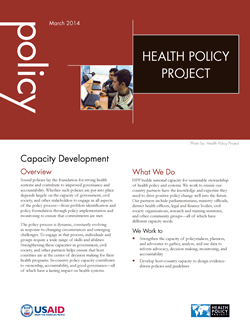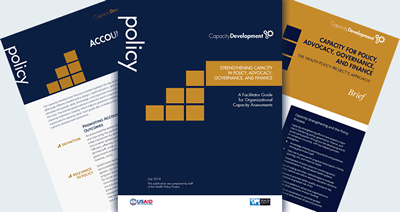The Health Policy Project ended in 2016. Work continued under Health Policy Plus (HP+) until 2022.
Capacity Development

Health Policy Project/Afghanistan
Overview
Capacity development is founded on principles of collaboration and partnership that enable global health efforts to interweave global guidance with local knowledge and context. This foundation enables creation of appropriate solutions and short-term successes, as well as continuity after an activity ends, fuelled by embedded capacity. Ideally, embedded capacity not only sustains progress, but also fosters continued evolution and self-renewal.
The Health Policy Project recognizes that capacity development:
- is a prerequisite of sustainability
- is an approach, not an event
- must be stated and intentional
- comprises MUCH more than knowledge transfer
- recognizes complex adaptive systems
- creatively employs technology
- can and should be measured and evaluated
- supports “capacity to develop capacity” through local or regional resource development
What We Do
The Health Policy Project embeds technical activities within state-of-the-art capacity development approaches to ensure they take firm root. The increasing array of stakeholders involved in global health policy and advocacy calls for an increasingly diverse portfolio of capacity development approaches—each appropriate to the context and truly accessible to various stakeholders. We work at multiple levels: supporting development within organizations and individuals, as well as critical capacities that exist among entities, in the form of productive relationships and other components that comprise effective systems.
A Portfolio of Capacity Development Approaches
New understandings based on cognitive learning theory, change management, and complex adaptive systems have illuminated the need for a range of capacity development approaches, in addition to training events.
Based on each unique environment, The Health Policy Project overlays technical work with a capacity development approach crafted from a range of techniques:
- Short-term Technical Assistance, a.k.a. “sitting together.” Within the context of a positive professional relationship, collaboration that fosters reflection and critical thinking in one’s work environment is highly effective. Progress is made toward short-term objectives while supporting long-term capacity.
- Colleague-based Approaches. Research has shown that high quality on-the-job and peer-based learning are among the most effective forms of capacity development. Techniques include seconding, mentoring, coaching, internships and study tours.
- Co-creation of Models, Tools, and other Intellectual Property. This approach also hits multiple targets at once. Short-term outcomes take the form of customized products or processes that can then be replicated within a setting, while the local co-creator(s) (including organizations) develop capacity to integrate global knowledge with local realities to create appropriate solutions.
- Convening and Connecting. “Capacity development 2.0” recognizes that many improved health outcomes result from what happens between individuals, institutions and organizations, and within larger systems, ranging from the community to global levels. Capacity often exists in the highly intangible form of connections among stakeholders. Conceptualizing, creating and maintaining those linkages is both an art and a science. The Health Policy Project both facilitates the connections and strengthens partner capacity to do the same.
- Digital Learning Platforms. Todays’ technologies make a highly effective “blended learning” (combination of face-to-face and digital) approach a feasible option. This approach can cut costs over the medium- and long-term; enable standardized, easily repeatable training and certifications; and cut down on staff time and expenses associated with convening in-person events.
- Capacity to Develop Capacity: International capacity support can be expensive and complex—compared to local or regional options. The Health Policy Project supports the development of organizations and institutions to take over capacity development in the long run, thus cutting costs, supporting local economies, and enabling consistent capacity support from people and organizations that are intimately familiar with local systems, culture, and history.
- Other approaches: As applicable, other approaches The Health Policy Project employs include capacity development in strategic and action planning and implementation; grantmaking; sponsorship of formal education; and follow-up support with regards to all of these approaches.
HPP’s Organizational Capacity Assessment (OCA) Suite of Tools helps organizations or institutions along the path to becoming organizations capable of fulfilling the functions necessary to achieve health policy objectives in low- and middle-income countries. The tools are highly participatory and designed to be facilitated by someone outside an organization's staff. The suite simultaneously shows how to orient key organizational stakeholders to relevant capacity issues and how to conduct a self-assessment and scoring process. The tools then guide participants through a results debrief and action planning for strategic capacity improvements.
The Next Generation of Organizational Capacity Assessments: An Integrated Approach
We’ve taken a standard approach, The Organizational Capacity Assessment (OCA), to the next level. We’ve broken down state-of-the-art technical knowledge about policy, advocacy, governance, and finance into easy-to-understand components. We’ve maximized the learning and change potential inherent in the facilitated self-assessment processes that define the model.
Yet the initial assessment is only the starting point, rather than an end it itself—it leads the way to self-conceptualized and self-driven improvements. Embedded in the model are systems for tracking change, analyzing progress, and making strategic choices along the way.
Once specific objectives are reached, the value of the OCA lives on—serving as a reference for next steps and a framework within which future projects can be integrated.
Publications and Resources
The Organizational Capacity Assessment Suite of Tools
Seconding as a Capacity Development Tool for Global Health: Lessons from the Field
Increasing Capacity in GBV Programming from Program Integration to Community Perceptions
News
Sustaining the Benefits of Capacity Development for Health Policy in India
The USAID- and PEPFAR-funded Health Policy Project (HPP) /India held a symposium in New Delhi on May 12, 2015. The event brought 25 representatives from state governments, academic/research institutions, nongovernmental organizations, and civil society organizations together with a distinguished group of speakers to discuss HPP/India’s work since 2011—particularly in the states of Uttarakhand, Jharkhand, and Uttar Pradesh.
Linking the Intangibles of Capacity Development to Real-World Change
An online seminar covered issues complicating the pursuit of capacity development by the global health community. “Capacity Development: Where Is It Heading? Practical Insights for Improving Global Health Outcomes” was convened by HPP—funded by USAID and PEPFAR—as one of many knowledge-sharing activities scheduled from now to September 22, when the project will end.
Book review: Media and Development by Martin Scott
Where do Communication for Development, Media Development and Media Representations of Development overlap, and where do they differ? This book addresses those questions, as well as the implications for global capacity development.
African Women Leaders Add their Voices to Development
Nyokabi Ruth Musila is one of 24 participants in a workshop to strengthen African women leaders' participation in defining country priorities for family planning and reproductive health.
Information System Helps Manage Social Services in Guatemala, Gains Government’s Support
Integrated Social Information System helps Guatemalan government agencies improve the management of health and education programs.



